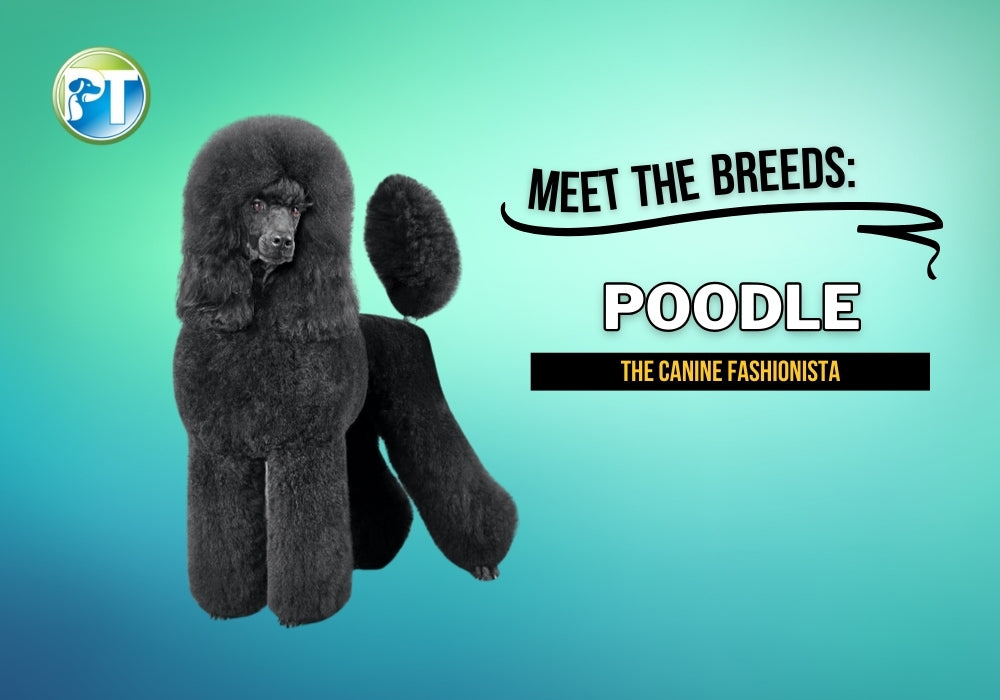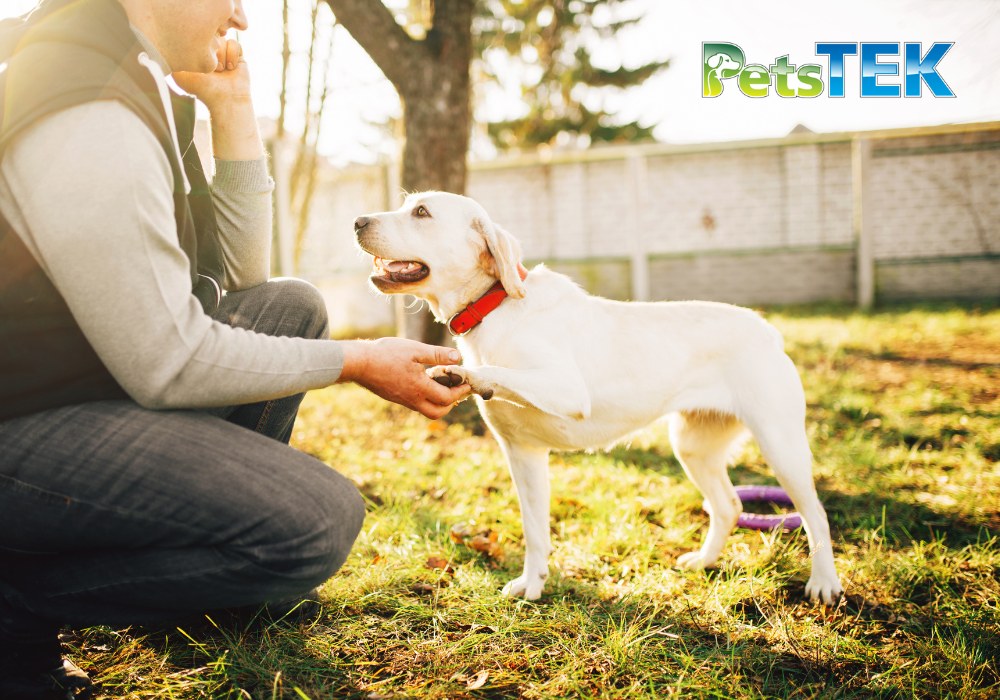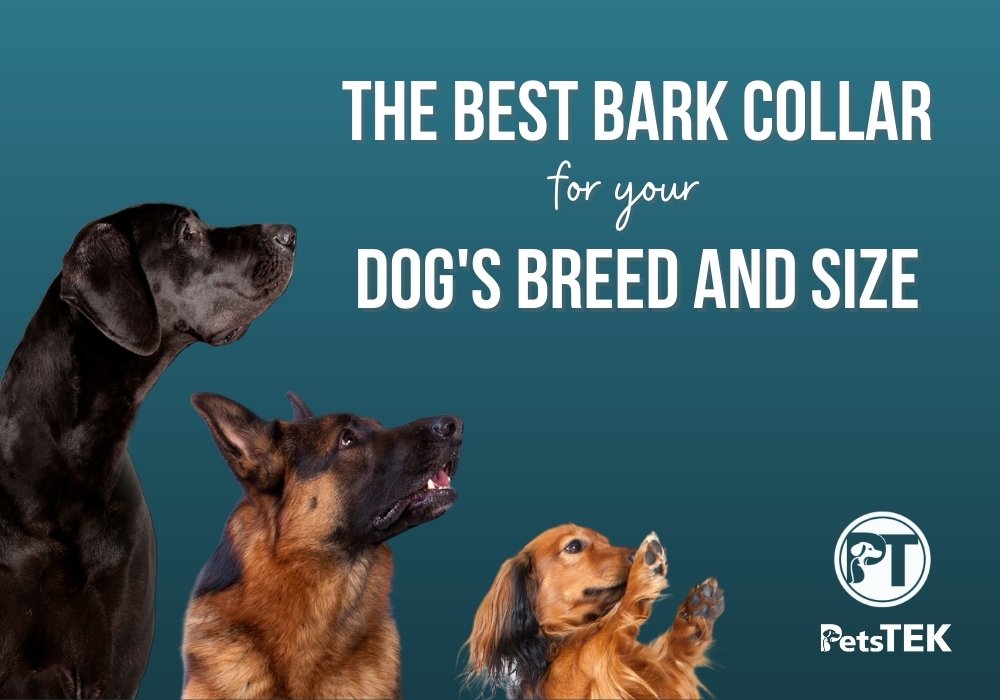Meet the Poodle Breed – Traits, Care, Training, and Grooming

Poodles are one of the most recognizable dog breeds in the world, known for their elegant appearance, intelligence, and versatility. Often associated with luxury and showmanship, Poodles are far more than just fancy show dogs. They are loyal companions, exceptional athletes, and an intelligent dog breed, making them excellent pets for various households.
Key Traits of a Poodle

The Poodle comes in three sizes: Standard, Miniature, and Toy. Each size offers the same general traits but in different packages. Poodles are part of the non-sporting group according to the American Kennel Club (AKC). They are known for their curly coats and dignified appearance.
- Height:
- Standard Poodle: Over 15 inches
- Miniature Poodle: 10-15 inches
- Toy Poodle: Under 10 inches
- Weight:
- Standard Poodle: 40-70 pounds
- Miniature Poodle: 10-15 pounds
- Toy Poodle: 4-6 pounds
- Lifespan: Poodles typically live between 10 to 18 years, with Toy Poodles often having the longest lifespans.
- Appearance: Poodles have a curly, dense coat often styled in various cuts for show purposes. They have a long, elegant neck, a straight back, and a proud, graceful gait.
- Temperament: Poodle dogs are known for being intelligent, alert, and active. They are eager to please and can be trained to do almost anything. They are also known for their affectionate nature and strong bond with their owners.
Where Did the Poodle Originate?

Despite their association with France, Poodles actually originated in Germany, where they were used as water retrievers. The name "Poodle" comes from the German word "Pudel," which means "to splash in water." Over time, they became popular in France, where they were further refined into the breed we know today. Poodles were favored by the nobility and even became the national dog of France.
The breed was originally bred for retrieving waterfowl for hunters. In fact, their iconic "Poodle cut" was designed to help them swim better while keeping vital organs warm. This practical purpose eventually gave way to more decorative grooming, but the breed's intelligence and versatility have remained constant.
Physical Traits of a Poodle

Poodles are immediately identifiable due to their distinctive appearance. Here's what makes them stand out:
- Coat: The Poodle's coat is curly and dense, making it water-resistant. It comes in a variety of colors, including black, white, apricot, and gray.
- Head: Poodles have a long, straight muzzle and a slight stop. Their eyes are oval and dark, conveying an alert and intelligent expression.
- Ears: The ears of a Poodle are long and hang close to the head, covered in thick hair.
- Tail: Traditionally, Poodle tails were docked, but this practice is becoming less common. The tail is typically set high and carried up or curled slightly over the back.
Behavior and Training Tips for Poodles

Poodle dogs are highly intelligent and eager to please, making them relatively easy to train. However, their intelligence means they require mental stimulation. Without it, they may become bored and develop undesirable behaviors, such as excessive barking.
- Start Training Early: Like all dogs, Poodles benefit from early training and socialization. They are quick learners, so consistency and positive reinforcement will yield the best results.
- Use Positive Reinforcement: Poodles respond well to positive reinforcement, such as treats, praise, and play. This encourages desired actions and builds a strong bond with your dog.
- Mental Stimulation: Poodles thrive on mental challenges. Incorporating puzzle toys, obedience training, and new tricks into their routine will keep them happy and engaged.
Exercise
Poodles, especially the Standard variety, need regular exercise to stay healthy. They are energetic and enjoy activities like running, swimming, and playing fetch. However, exercise needs can vary depending on the Poodle's size.
- Standard Poodles require at least an hour of exercise daily.
- Miniature and Toy Poodles may only need 30 to 45 minutes.
Due to their intelligence, they also enjoy activities that challenge them mentally, such as agility courses, obedience training, and interactive toys. Regular exercise not only keeps them fit but also helps prevent behavioral problems that can arise from boredom.
Tackling Excessive Barking in Poodles

Poodles can be quite vocal and may bark frequently, which can become a nuisance if not addressed. To address this behavior, it's important to first identify the cause of the barking, whether it's due to boredom, anxiety, or alertness. Consistent training with positive reinforcement, such as rewarding your Poodle for staying quiet on command, can be highly effective.
However, if the barking persists, consider using a bark collar as a training aid. This, combined with continued positive reinforcement, can help your Poodle learn when it's appropriate to be quiet.
Best Bark Collars for Poodles
When choosing a bark collar for your Poodle, consider both their size and temperament.
For Poodles with a timid temperament, spray or vibration collars can be effective options, as they offer gentle deterrents to discourage barking. However, for Poodles with a mild to stubborn personality, a static bark collar might be a suitable option. This type of bark collar provides consistent and safe stimulation, making it effective for managing persistent barking.
Here are our top bark collar recommendations:
1. BP-504 Barkless Pro Anti Bark Collar by E-Collar Technologies
Best for Dog Size: 5 Pounds and Up
Collar Receiver Size: 2.36” x 1.57” x 1.57”
Collar Receiver Weight: 1.9 oz
The BP-504 Barkless Pro Anti-Bark Collar features an advanced vibration sensor that accurately detects barking, reducing false corrections. It offers 9 levels of stimulation, 3 stimulation modes, and 3 levels of bark sensitivity.
This dog bark collar also comes with three different training modes:
- Auto-Mode - This adjusts the correction level based on the barking intensity.
- Manual Mode - This allows you to set the stimulation level.
- Tone-Only - This option only delivers an audible correction.
2. Dogtra iQ Vibe Vibration-Only No Bark Collar
Best for Dog Size: 10 Pounds and Up
Collar Receiver Size: 1.49" x 2.20" x 1.42"
Collar Receiver Weight: 1.5 oz
The Dogtra iQ Vibe relies solely on vibrations to discourage unwanted barking. The vibration strength is about four times that of a normal cellphone. With three intensity levels, you can find the ideal setting for effective control without discomfort.
This collar features a microphone-based bark sensor that distinguishes your dog's bark from surrounding noises, minimizing false corrections.
3. Dogwatch BT-7 No-Bark Trainer
Best for Dog Size: 4 Pounds and Up
Collar Receiver Size: 2.67” x 1.18” x 1.57”
Collar Receiver Weight: 1.7 oz
The DogWatch BT-7 No-Bark Trainer offers 7 static levels and a vibration option, allowing customization based on your dog's needs. It includes short and extended prongs for optimal contact.
Moreover, its Bark Forgiveness feature introduces a brief delay before correction, helping your dog differentiate between acceptable and excessive barking. This teaches that occasional barking is normal, but excessive barking is not tolerated.
4. PetSafe Lite Rechargeable Bark Collar (PBC00-16446)
Best for Dog Size: 8 Pounds and Up
Collar Receiver Size: 2.16” x 1.46” x 1.05”
Collar Receiver Weight: 1.44 oz
The PetSafe Lite Rechargeable Bark Collar offers a unique advantage: automatically adjusting correction levels. As your dog barks, the intensity increases until the barking stops, then it resets to the lowest setting. This feature, combined with its mild correction settings, makes it ideal for small, sensitive, and shy dogs.
5. PetSafe Elite Little Dog Spray Bark Collar (PBC00-11283)
Best for Dog Size: 8 to 55 Pounds
Collar Receiver Size: 1.7” x 1.06” x 0.98”
Collar Receiver Weight: 2.26 oz
The PetSafe® Elite Little Dog Spray Bark Collar is a compact and waterproof bark collar designed for smaller dogs. It features a Perfect Bark® sensor to accurately detect barking and a soft spray deterrent to discourage excessive barking. The collar is adjustable and easy to use, with a replaceable battery.
Caring and Management Tips for Poodles

Proper care and grooming are essential to keeping your Poodle healthy and looking its best.
Grooming and Fur Brushing
Poodles have a unique curly coat that requires regular grooming to prevent matting and maintain its appearance. Depending on the length and style of the coat, Poodles should be brushed several times a week. Professional grooming every 4 to 6 weeks is recommended, especially for those with elaborate cuts.
- Tools Needed: Use a slicker brush and a metal comb to thoroughly brush your Poodle's coat, removing any tangles or mats.
- Professional Grooming: Consider visiting a professional groomer to maintain a specific cut or for a thorough clean-up.
Nail Trim
Poodles, like all dogs, need their nails trimmed regularly to prevent them from becoming too long and causing discomfort. Depending on how active your dog is, this could be needed every 3 to 4 weeks.
- Trimming Tips: Use a dog nail clipper or grinder, and be careful not to cut too close to the quick to prevent bleeding.
Bath
Regular baths are important for keeping your Poodle's coat and skin healthy. They should be bathed every 3 to 4 weeks, or more often if they get particularly dirty.
- Shampoo: Use a high-quality dog shampoo that is appropriate for your dog’s skin and coat type.
- Drying: Thoroughly dry their coat after a bath to prevent moisture from getting trapped in the curls.
General Health
Keeping your Poodle healthy involves more than just regular grooming. Here are some essential aspects of their care:
Eye Care
Poodles are prone to eye issues like cataracts and progressive retinal atrophy. Regular vet checks and keeping the area around the eyes clean can help prevent infections and other problems.
- Routine Checks: Wipe away any discharge around the eyes with a damp cloth.
Ear Care
Due to their long, floppy ears, Poodle dogs are prone to ear infections. Regular ear cleaning is essential to prevent this.
- Cleaning: Use a vet-recommended ear cleaner and cotton balls to gently clean your Poodle’s ears weekly.
Oral Care
Dental hygiene is crucial for this breed type, especially the smaller varieties, which are more prone to dental issues.
- Brushing: Brush your pet's teeth several times a week using dog toothpaste and a toothbrush designed for dogs.
- Dental Chews: Consider providing dental chews to help reduce plaque and tartar build-up.
Diet and Nutrition
Poodles require a balanced diet that meets their nutritional needs based on their size, age, and activity level. Feeding high-quality dog food, whether commercial or home-prepared with a vet's guidance, is key to their overall health.
- Portion Control: Be mindful of portion sizes to prevent obesity, which Poodles can be prone to.
- Special Diets: Consult with your vet if your pet has any special dietary needs, such as for allergies or health conditions.
Common Health Problems of Poodles
Poodles can be prone to certain hereditary conditions, and some common health problems include:
- Hip Dysplasia: Particularly in Standard Poodles, this condition can cause pain and mobility issues.
- Addison’s Disease: This hormonal disorder is more common in Poodles and affects the adrenal glands.
- Gastric Dilatation-Volvulus (GDV): Also known as bloat, this is a life-threatening condition that can affect Standard Poodles.
- Epilepsy: Poodles can suffer from seizures, which may require medication to control.
What Type of Owners Will Do Well with a Poodle?

Poodles are versatile and adapt well to various living situations, making them suitable for a wide range of owners.
- Active Individuals or Families: Poodles enjoy exercise and play, making them a great match for active households.
- Those with Allergies: Poodles are hypoallergenic, meaning they are less likely to cause allergic reactions, which makes them ideal for allergy sufferers.
- First-Time Dog Owners: Their intelligence and eagerness to please make them relatively easy to train, which is great for new dog owners.
Is a Poodle a Perfect Match for You?
If you're looking for a loyal, intelligent, and versatile companion, a Poodle dog might be the perfect choice. They thrive in environments where they receive plenty of attention, mental stimulation, and regular exercise. However, they do require regular grooming and care, so potential owners should be prepared for this commitment.
FAQs About the Poodle
Why are Poodles so high maintenance?
Poodles are considered high maintenance primarily due to their curly, dense coat, which requires regular grooming to prevent matting. They also need consistent mental and physical stimulation to stay happy and well-behaved.
Is a Poodle a good family dog?
Yes, Poodles are excellent family dogs because they are intelligent, affectionate, and generally good with children. They adapt well to various household dynamics and enjoy being part of family activities.
What are Poodles good for?
Poodles excel in various activities, including obedience training, agility, and even hunting, thanks to their intelligence and versatility. They are also great companions and are often used as therapy and service dogs.
You might also enjoy...
-
Posted in
Pet Health, Pet Training, Training Tips







